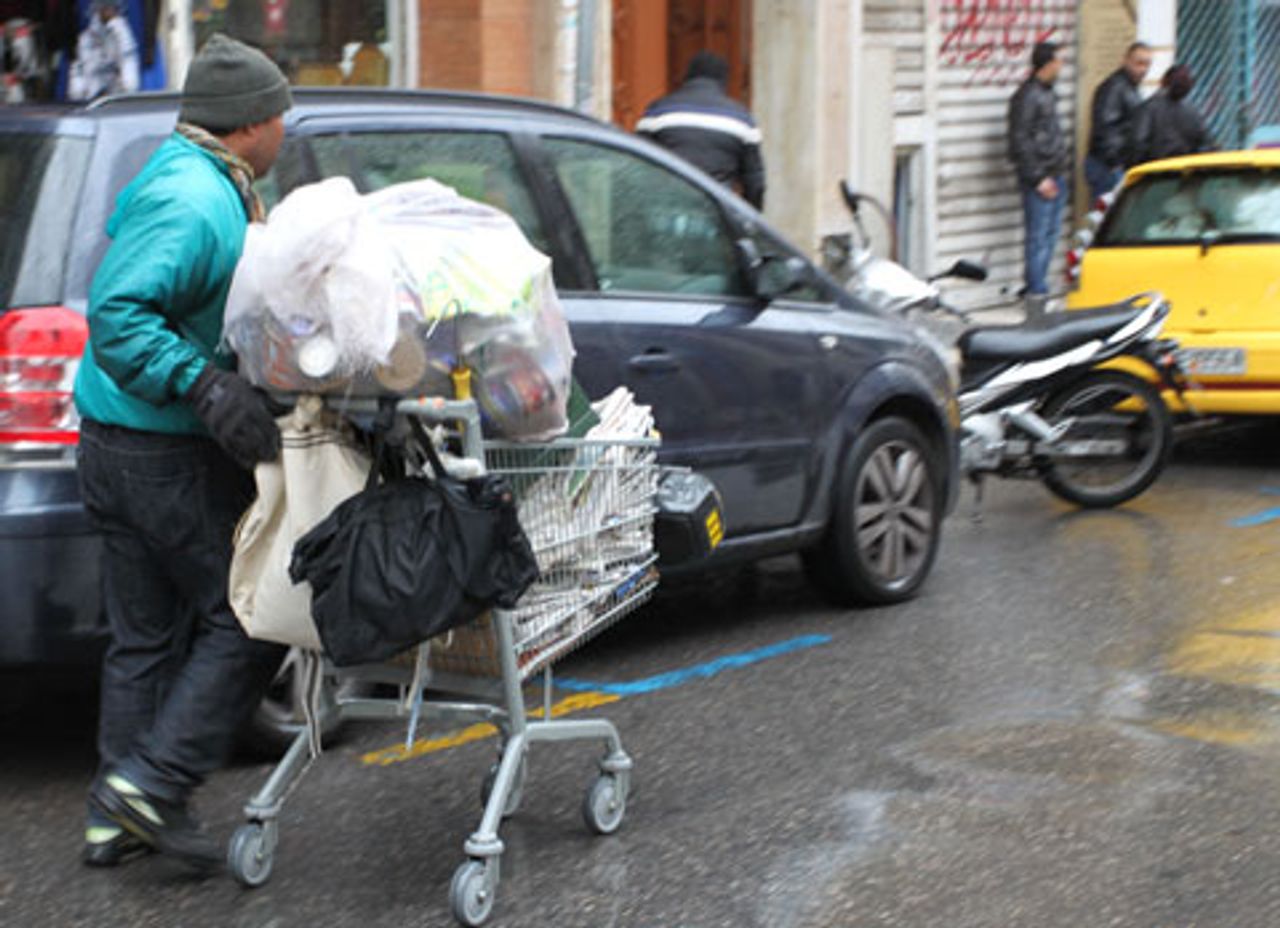 A homeless man on Sophokleous Street
A homeless man on Sophokleous StreetThe social devastation of Greece over the past three years has led to a drastic increase in homelessness and hunger.
It is officially estimated that a third of Greeks now live below the poverty line, but things are much worse in reality. According to the national statistics bureau ELSTAT, more than 3 million (27.7 percent) of Greece’s 11 million people were already on the edge of poverty or social exclusion in 2010, at the start of the crisis. Since then, the conditions of life for millions have worsened immeasurably.
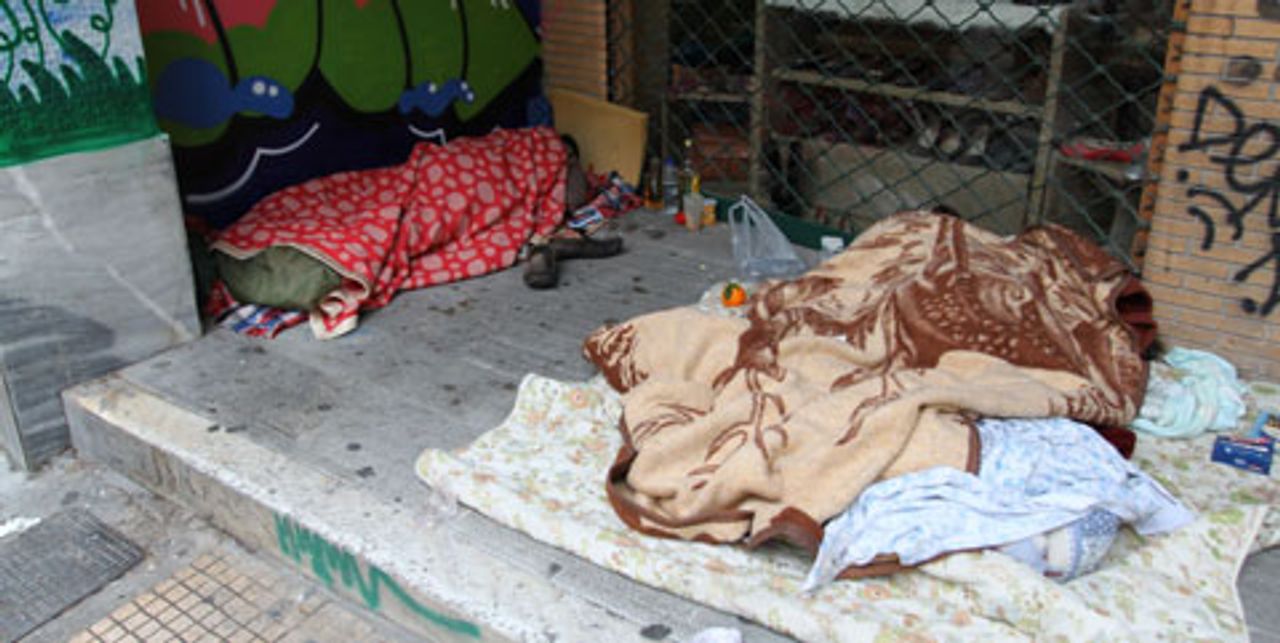 Homeless people at Monastiraki metro station
Homeless people at Monastiraki metro stationMass unemployment is now permanent, with the official jobless rate at 21 percent. For the first time, more than 50 percent of youth are without a job. More than 500,000 people have no income whatsoever in what was, until a few years ago, a nation with rising living standards. So desperate is the situation that some 500,000 people have left the country.
With 1,000 people a day being made unemployed, along with a never-ending onslaught on wages and benefits, an ever widening layer of society is now known as the “new homeless.”
This month, Christos Papatheodorou, social politics professor at the Democritus University of Thrace, told the AFP news agency that homelessness “risks exploding.”
The official poverty figures cited by ELSTAT do not include the thousands of homeless people in Greece. Papatheodorou noted that the European Union statistics institute Eurostat and national agencies “base their figures on a typical household, that is, on those having a roof above their heads. Therefore, the increase of extreme poverty among homeless people does not appear in the statistics.”
The Financial Times commented this month: “As Greece’s crisis deepens, the social fabric is showing signs of unravelling, raising questions about how much more austerity the country can take. Job losses, along with pension cuts, have created a new class of urban poor.”
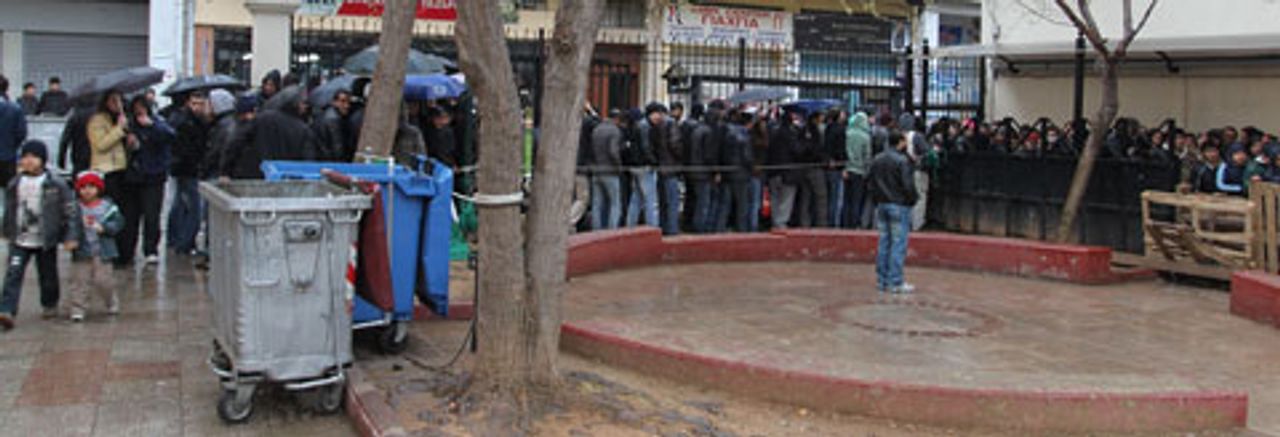 People queue for a free meal at the soup kitchen on Sophokleous Street
People queue for a free meal at the soup kitchen on Sophokleous StreetThis entrenched poverty can be seen throughout Athens. In the last year alone an estimated 20,000 people have been homeless in Greece’s capital. This new army of homeless people has had to endure one of the coldest winters in living memory.
A World Socialist Web Site reporting team visited two soup kitchens in the city.
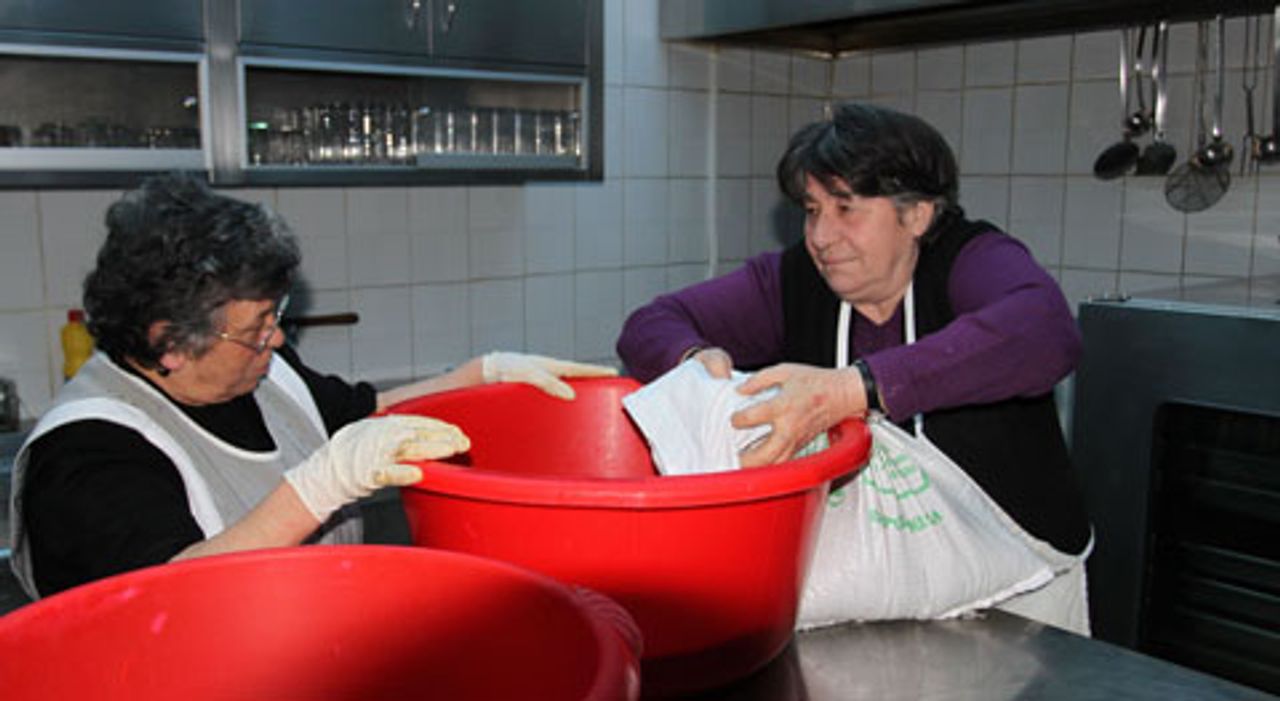 Georgia Exarchou and a co-volunteer prepare a meal at the church soup kitchen
Georgia Exarchou and a co-volunteer prepare a meal at the church soup kitchenGeorgia Exarchou works as a volunteer cook at the soup kitchen organised by the Agia Asomaton Church on Thermopylon Street, near the historic Agora marketplace. She told the WSWS: “When I started here in 2004, 20 to 30 people asked for a meal each day. One-and-a-half years ago the number was 100. Since then it has risen to 250 per day and among them are more and more children.”
Exarchou has worked for eight years as a volunteer at the kitchen, which is mainly used by native Greeks. She works with ten other volunteers.
Her church receives surplus and out-of-date food from supermarkets and organizes 67 soup kitchens in Athens. Churches feed more than 250,000 people a day all over Greece. “We get no support from the government for this work,” she explained. “They destroyed society in Greece. Greece used to be a nice country, but they destroyed it.”
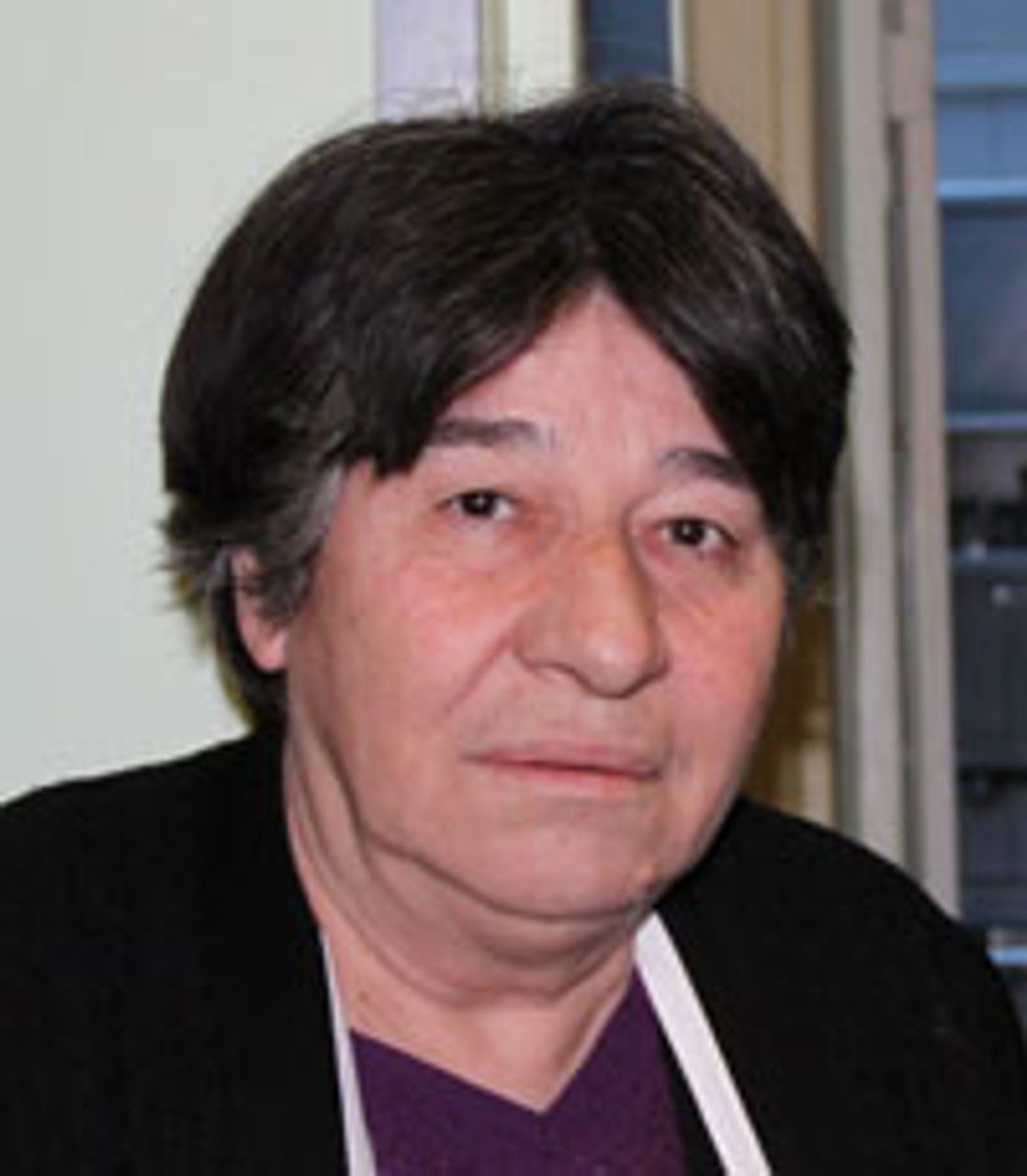 Georgia Exarchou
Georgia ExarchouShe continued: “People come here with a lot of problems. A lot of them are homeless. Most of them have health problems. We send them to other help organizations. A lot of people have lost their jobs and can’t afford food any longer. They can’t find work, get no financial support and can’t get the finance to feed their families.”
Exarchou was a young girl when the fascist military regime took power in Greece in 1967. “If it goes on like this, it is going again in the direction of a junta,” she warned.
On nearby Sophokleous Street a building is used to serve food mainly to foreigners and asylum seekers. It is one of the oldest soup kitchens in Athens. One of the feedings is organised by the Agia Asomaton Church.
On this day, some 200 people queued up to receive a small portion of rice and a piece of chicken. Among the people receiving food were young mothers with their children. There were very few chairs available and most people ate standing up in a courtyard area, barely sheltered from the pouring rain.
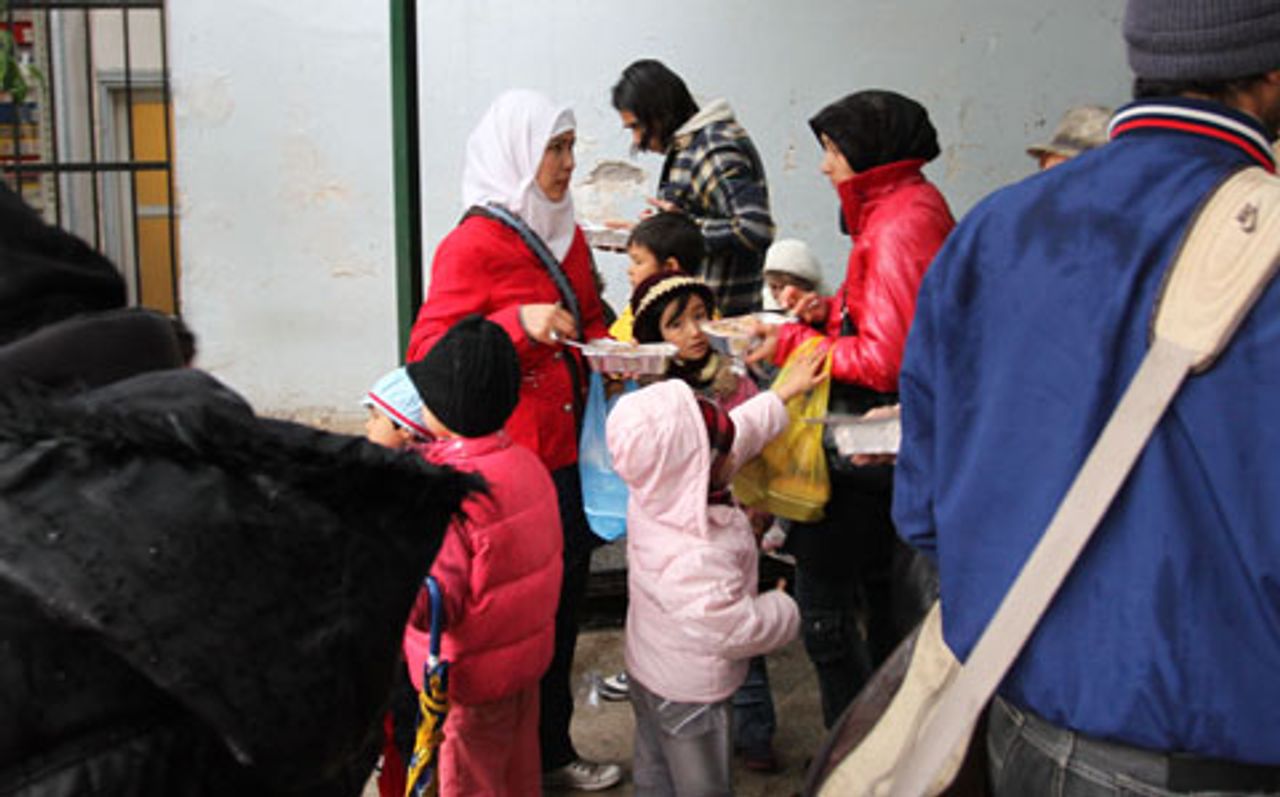 People eating food at the soup kitchen on Sophokleous Street
People eating food at the soup kitchen on Sophokleous StreetAfter half an hour, all the people were asked to leave the courtyard and the remains of the food were left to dozens of pigeons. Those who had just eaten began to walk home or walk the streets looking for a dry place to stay for the evening.
One man from Algeria had lived in Paris for a period before coming to Greece. “The social situation in Greece is horrible,” he said. “This is not Europe, Paris is Europe, but here it’s not.” He wanted to return to Algeria because he had a better standard of living there than existing on the street in Greece.
Aamen said he had arrived in Greece from Iran a year ago, hoping for a better life. “I prepared to move to Greece for years,” he said. “Now I am here, but there is no better life anymore. The government destroyed the future of all of us.”
One of the homeless people at the soup kitchen said it was now common for people to ask for food handouts from their neighbors. He said that later in the evening there would be homeless people in some of the main squares looking for food in the garbage.
Leaving the Sophokleous Street soup kitchen, one saw many homeless people sitting or sleeping in doorways. An elderly Greek man was lying on a makeshift bed close to the Monastiraki metro station in central Athens. He explained that he had lived in the streets for ten years and his total income was just eight euros a week.
“You don’t see the new homeless at central places like metro stations, because they are ashamed and prefer to sleep in lonely corners,” he said. “The number of homeless has increased so much. Greece is falling into the Middle Ages again.”
Because of the infected sores that cover his lower legs and feet, he requires daily medical care. Up to now he had managed to get medication from the Doctors of the World, a non-governmental humanitarian aid organisation. However, as a result of the worsening economic crisis, getting access to treatment has become much more difficult. He said he received a smaller dose of his medicine than usual this week.
